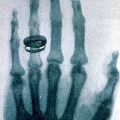Federated learning (FL) enables multiple sites to collaboratively train powerful deep models without compromising data privacy and security. The statistical heterogeneity (e.g., non-IID data and domain shifts) is a primary obstacle in FL, impairing the generalization performance of the global model. Weakly supervised segmentation, which uses sparsely-grained (i.e., point-, bounding box-, scribble-, block-wise) supervision, is increasingly being paid attention to due to its great potential of reducing annotation costs. However, there may exist label heterogeneity, i.e., different annotation forms across sites. In this paper, we propose a novel personalized FL framework for medical image segmentation, named FedICRA, which uniformly leverages heterogeneous weak supervision via adaptIve Contrastive Representation and Aggregation. Concretely, to facilitate personalized modeling and to avoid confusion, a channel selection based site contrastive representation module is employed to adaptively cluster intra-site embeddings and separate inter-site ones. To effectively integrate the common knowledge from the global model with the unique knowledge from each local model, an adaptive aggregation module is applied for updating and initializing local models at the element level. Additionally, a weakly supervised objective function that leverages a multiscale tree energy loss and a gated CRF loss is employed to generate more precise pseudo-labels and further boost the segmentation performance. Through extensive experiments on two distinct medical image segmentation tasks of different modalities, the proposed FedICRA demonstrates overwhelming performance over other state-of-the-art personalized FL methods. Its performance even approaches that of fully supervised training on centralized data. Our code and data are available at https://github.com/llmir/FedICRA.
翻译:联合学习(FL)使多个站点可以在不损害数据隐私和安全的情况下协同训练强大的深度模型。统计异构性(例如,非独立同分布数据和领域转移)是FL中的一个主要障碍,这会损害全局模型的泛化性能。弱监督分割越来越受到关注,因为它可以显著降低注释成本,而且可以使用稀疏的监督(点、边界框、涂鸦、块)来实现。然而,可能存在标签异构性,即不同站点之间的标签形式不同。本文提出了一种新颖的个性化FL框架,用于医学图像分割,命名为FedICRA,它通过自适应对比表示和聚合统一利用异构弱监督。具体来说,为了促进个性化建模并避免混淆,利用基于通道选择的站点对比表示模块,自适应地聚类局部嵌入并分离站点之间的嵌入。为了有效地整合全局模型中的通用知识和每个本地模型的独特知识,应用了一种自适应聚合模块,用于在元素级别更新和初始化本地模型。此外,采用一种弱监督目标函数,利用多尺度树能量损失和门控CRF损失,以生成更精确的伪标签,并进一步提高分割性能。通过对两个不同模态的医学图像分割任务进行广泛的实验,所提出的FedICRA表现优异,超过其他最先进的个性化FL方法。其性能甚至接近于在集中数据上进行完全监督训练。我们的代码和数据可在https://github.com/llmir/FedICRA上找到。


